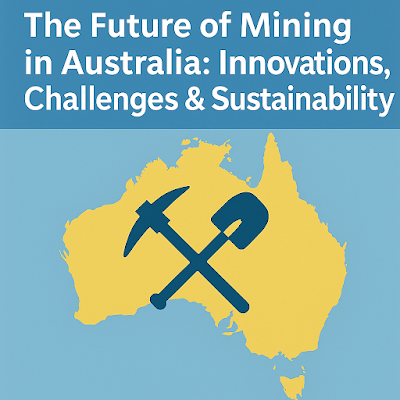Introduction to Mining in Australia
Australia has long been a global leader in the mining industry. From vast reserves of iron ore and coal to rare earth minerals, the country's natural resources have shaped not just its own economy but influenced global supply chains. However, the future of mining in Australia is undergoing a significant transformation. Driven by innovation, sustainability goals, and global demand for green energy, mining in Australia is shifting gears rapidly.
In this post, we’ll explore how the mining sector in Australia is evolving, the emerging technologies reshaping its landscape, the sustainability challenges it faces, and how it compares to mining developments in regions like Europe and North America.
1. Current State of Mining in Australia
Australia’s mining sector contributes over 10% to the GDP and employs thousands directly and indirectly. Major exports include:
- Iron Ore
- Coal
- Bauxite
- Gold
- Lithium
Top Mining Regions:
- Western Australia (Pilbara region – iron ore)
- Queensland (coal mining)
- South Australia (copper and uranium)
Despite its strength, the industry faces pressure to reduce its environmental footprint and modernize operations.
2. Innovations Driving the Future
Automation and Robotics
Automation is revolutionizing mining operations. Companies like Rio Tinto and BHP are already using autonomous trucks, drills, and trains in Western Australia’s iron ore mines. This reduces human risk and boosts efficiency.
Artificial Intelligence (AI) and Data Analytics
Predictive maintenance, geological modeling, and production optimization are now driven by AI and big data.
Remote Operations
Control centers in cities now monitor and operate mines hundreds of kilometers away, reducing onsite workforce and enhancing safety.
💡 Australia’s “Mine of the Future” concept focuses heavily on tech-led efficiency.
3. The Push Toward Green Mining
The future of mining in Australia is inseparable from sustainability. Global climate agreements and ESG expectations are pushing miners toward greener operations.
- Electrification of mining equipment
- Carbon capture and storage (CCS)
- Use of renewable energy at mining sites (e.g., solar farms in WA mines)
- Recycling of water and tailings
These efforts align Australian mining with international goals and enhance investor confidence.
4. Challenges Ahead
Even with tech progress, there are hurdles to the industry's future:
- Environmental concerns: Indigenous land rights, water usage, and emissions
- Skilled labor shortage: Demand for digitally skilled miners
- Regulatory pressures: Stricter policies on emissions and community impact
- International competition: Countries like Canada and Chile are catching up in lithium and rare earth mining
5. The Role of Lithium and Rare Earths
With the global shift to electric vehicles (EVs), Australia’s lithium reserves make it a key player in the green revolution. Western Australia’s Greenbushes lithium mine is one of the largest globally.
Rare earth mining is also expanding, especially with growing tensions around China’s dominance in this sector.
📈 According to Geoscience Australia, Australia holds 17% of the world’s lithium resources.
6. Comparing with Mining in Europe & North America
|
|
|
|||
|
Australia |
Iron Ore, Lithium, Coal |
Emission, Land use, Climate Targets |
|||
|
Europe |
Green Mining, Underground Ops |
Land Regulation, Urban Proximity |
|||
|
North America |
Copper, Gold, Oil Sand |
Indigenous Rights, ESG compliance |
7. Government Policies & Funding
Australian government supports innovation through grants like the CRC for Mining and tax incentives for R&D. Regulations are also becoming stricter to align with the 2050 net zero goal.
Mining companies must now disclose ESG metrics and engage local communities more actively.
8. Career Opportunities in Modern Mining
The digital mining revolution is opening jobs in:
- AI & automation engineering
- Remote systems operation
- Environmental management
- Mining cybersecurity
Young Australians are now entering mining with tech backgrounds, not just geology or engineering degrees.
9. Internal Insights: How This Affects Global Mining Trends
Australia’s innovations are setting benchmarks for mining globally. Future posts will explore how:
- Canada’s mining industry is adapting to new technologies
- Green mining in Germany is reshaping Europe’s extraction practices
- Underground mining in the US is balancing productivity and safety
10. Final Thoughts
The future of mining in Australia is promising but complex. Sustainability, digitalization, and global responsibility are shaping how companies mine, where they mine, and what they mine. For stakeholders—governments, investors, workers, and environmentalists—collaboration is key to making mining both profitable and responsible.

